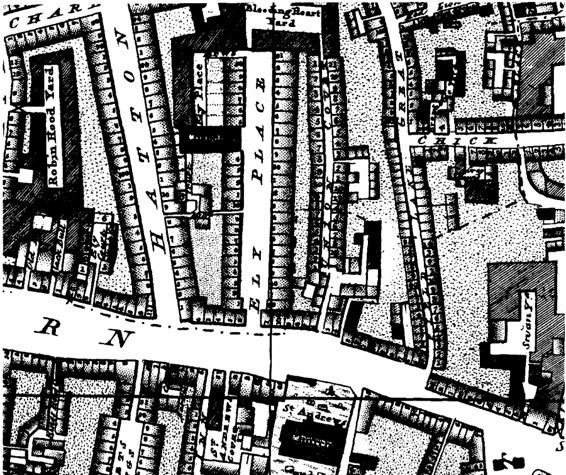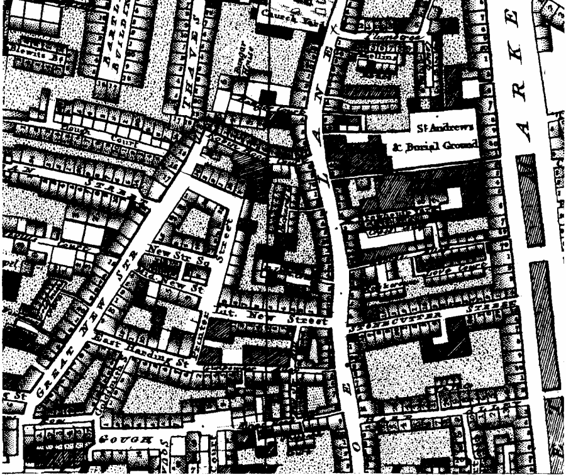Charles Palliser (78 page)
Authors: The Quincunx

It was almost full day now and people were stirring in the room. I noticed old Lizzie watching us from her corner.
Suddenly my mother raised herself and looked at me with terrible intensity: “That’s nonsense! Why are you saying such things? Mr Assinder told me: Sir Perceval and his wife don’t care about us now. They don’t need us alive.” There was a terrible coughing deep in her chest. “Do you think I’m so foolish, you too?” she managed to gasp. “Must everyone lie to me?”
“Mamma, I don’t understand you. It’s me. Johnnie. I haven’t lied to you.”
THE COMING OF AGE
355
“I know who you are,” she said with that same look. “You’ve always despised me for a fool.”
“No!” I cried. Then she began to cough as violently as if she were vomiting, and to my horror I saw flecks of blood spattering over her hands as she put them to her mouth.
I seized her arm and my hand almost closed round it, for it was so thin.
“Leave me alone!” she cried, shaking my hand away.
She stared round wildly and the pupils of her blue eyes seemed suddenly vacant now that I looked into them. And in that image of terror there came to me the time I had watched boys in Melthorpe stoning a cat they had trapped. Blood was dribbling down her chin now and her lips had turned blueish.
“I’m so frightened!” she gasped. “Help me!” Then, to my horror, she cried out:
“Mamma!”
As if in response, the old woman came across and looked at the blood with a kind of eagerness: “Aye,” she said. “As I feared. ’Tis the white plague.” Seeing my expression she added: “Consumption.”
“Get a surgeon!” I cried.
“Why,” she chuckled grimly, “there ain’t no sawbones as will come here. And besides, she’s too far gone now.”
My mother was gasping for breath and suddenly the old woman bent over her, pulled her head forward, and began thumping her on the back.
“Stop that!” I cried. She persisted until I seized her and pulled her violently away, and she retreated, muttering imprecations.
My mother fell back and lay quiet.
“I’m right, Mamma,” I went on after a minute, hoping to reassure her. “You’ll see. We will get some money from Sir Perceval and then we can rent a little house in Salisbury, like you said.”
Her head was turned slightly away from me now and I wasn’t sure if she heard me. I went on softly in case she was sleeping: “I will go to school and in a few years it will be time for me to be apprenticed and after that I will be able to keep us both.” As I spoke my voice broke. “You’ll see. It will be as it was before.”
I bent over my mother whose face was still turned away from me. Her eyes appeared to be open and I wondered if she were not sleeping after all.
“Mamma,” I whispered.
I felt a shadow fall across me and glanced up. The Irishwoman who had given me bread was beside me and was gazing at me with an expression I could not read. She reached past me and began to pull up the edge of the ragged blanket. She drew it further and further and when I saw her intention I put out my hand and cried “No!” She looked at me for a moment, and when I let my hand fall she went on pulling the blanket up until it obscured my mother’s face.

THE CLOTHIERS


HOLBORN (Scale: 1"=70 yards)
The top of the page is North

Inheritances
I invite you to return with me now to No. 27 Golden-square where, in that elegant morning-room with which you are familiar, we find Mrs Fortisquince in the middle of a rancorous argument with a guest.
“I don’t understand how she did it,” she is saying.
“Never mind how it happened. All that matters is that now we’ll get nothing for her from the old man.”
“It’s hardly my fault that she got away.”
“Oh no?”
“Certainly not. I believed I was the only friend she had in London. So she told me many times.”
“She lied,” Mr Sancious says bitterly. “You allowed yourself to be taken in by her plausible manner.”
“It is ungracious of you to reproach me. You owe everything to my generosity. When Mrs Clothier and her son came to me for help, did I not frankly come and confide in you?”
“You confided in me, certainly, ma’am, but you have been rewarded for that. And as for frankness, well I’m sure I don’t know how frank you’ve been. Why are you so anxious that old Clothier should not know of your involvement?”
“That is not your concern.”
“Well, he’ll have to know now for I’ll not take all the blame upon myself.”
Mrs Fortisquince fixes him with her gaze and says softly: “If you tell him, I promise you that you will regret it.”
The attorney bites his lip and then says: “Well, I suppose he doesn’t need to know. I’ll take the brunt of his anger myself, then. But at least he’ll be pleased that we’ve made the boy safe for him.” She nods and he adds: “And soon he’ll be even safer.”
Mrs Fortisquince, however, says sharply: “I hope you don’t mean …”
She leaves the rest unsaid.
He stares at her in amazement: “But that’s what we agreed!”
“Indeed we did not. We talked merely of making him safe.”
“But I believed you meant what is usually meant by that term.”
361
362
THE CLOTHIERS
“I don’t know what
you
meant by the term.
I
meant what is commonly meant: that we could lay our hands upon him when we wanted to. He must not be harmed. Not yet.”
“Your concern for the boy does you honour,” Mr Sancious says with a sneer.
“I promise you, if anything befalls him, I will go to the authorities.”
“I think not, Mrs Fortisquince, for in that case the good Quigg might say more than either of us would wish.”
They stare at each other and then the widow slowly smiles: “Come, it is foolish for us to quarrel when all we can achieve is to harm ourselves.”
“Well said, madam. We can gain so much more by being friends.”
Mrs Fortisquince rings for Checkland and instructs her to bring tea, and so ten minutes later the two are sitting comfortably together on the ottoman.
The widow looks thoughtfully at her guest and begins : “There is something I have been meaning to ask you for some time, Mr Sancious. As you perhaps know, I inherited from my husband some interests in landed property and securities.”
The attorney nods gravely.
“While he lived, of course,” Mrs Fortisquince goes on, “he handled them himself, and since his death my affairs have been in the hands of an attorney appointed by him as his executor. Though it seems disloyal to say it, I have not been altogether happy with his conduct of my affairs. In particular, now that the rate of interest on government stock has been reduced, I believe I could do better than my agent has been able to procure for me.”
“Most certainly you could, ma’am!” the attorney exclaims. “Have you considered the bill-market?”
“I have not. Is it not rather uncertain?”
“No indeed. It’s as safe as the Bank of England — quite literally so, for it is the Bank itself that ultimately backs up bills drawn upon the banking-houses. And the Bank has not even suspended payment in gold within your lifetime, for the last time that happened was in ’97.” (The lady smiles at the compliment.) “I have plunged heavily myself. And though at first I was hesitant, now I am glad that I allowed myself to be persuaded, for the market has soared so much that I only wish I had gone in earlier. The truth is, I have staked everything I have. The market has never done so well. Go in now, and I’ll wager that by Christmas you’ll bless me for it.”
Mrs Fortisquince raises her cup to her lips, watching him thoughtfully.
Of what happened then I have no clear recollection. I only recall shouting and screaming at the old woman and perhaps even trying to hit her, for I know that I had to be dragged away from her by the young Irishman. Then I remember feeling a sudden nausea and clutching my stomach in the belief that I was going to be sick, for I recall the expression on the man’s face as he released me and stepped back. And after that I recollect throwing myself on the floor beside her, possessed by a terrible rage and hitting the rotten boards with my fist and digging my nails into my palms until they bled. And one thing more I recall — that I did not weep.
INHERITANCES
363
I had refused to recognise what was plainly visible in her face when I had seen her on the steps of Mrs Purviance’s house just a few hours before, as if by denying it I could forestall it. I had prepared no defences against what had now happened and as the remorseless truth of it beat against me like an incoming tide, I felt myself collapsing inside like a fortress of sand built by a child. For I had never considered that she would die. And now as I thought of all the times I had answered her insolently or shewn my irritation at her or jeered at her understanding or pressed her too hard to reveal things she wished not to, I burned with remorse and rage.
Hours passed. I may have slept but I cannot say for there was no difference between my waking and dreaming nightmares: the hideous, unblinking, monstrous fact that she was dead. Then slowly I became aware that dim light was entering the chamber through the rag-stuffed and begrimed windows and that other people were stirring near me. I looked at the silent form beside me, the blanket still pulled over the face, and could not believe that she would not tug it away and smile at me and tell me it had all been a game.
I heard rough voices, children crying, drunken shouts and curses from which one cry emerged: “Stow yer racket, for the last time.” I did not look round to see if the speaker was addressing me but when I turned my head some minutes later I found that Lizzie was sitting near-by cross-legged, combing her straggling grey locks with one claw and watching me.
“Don’t take on so,” she said. “You’ll get over it.”
The thought horrified me: I did not want to be the person I would have to become if I ever got over it.
“You’ve no money to bury her, have you?” the crone continued.
I shook my head.
“You must go to the paritch,” she said. “They will take care on her.”
When I paid her no attention she seized my arm: “You’ve got to bury her dacent.”
